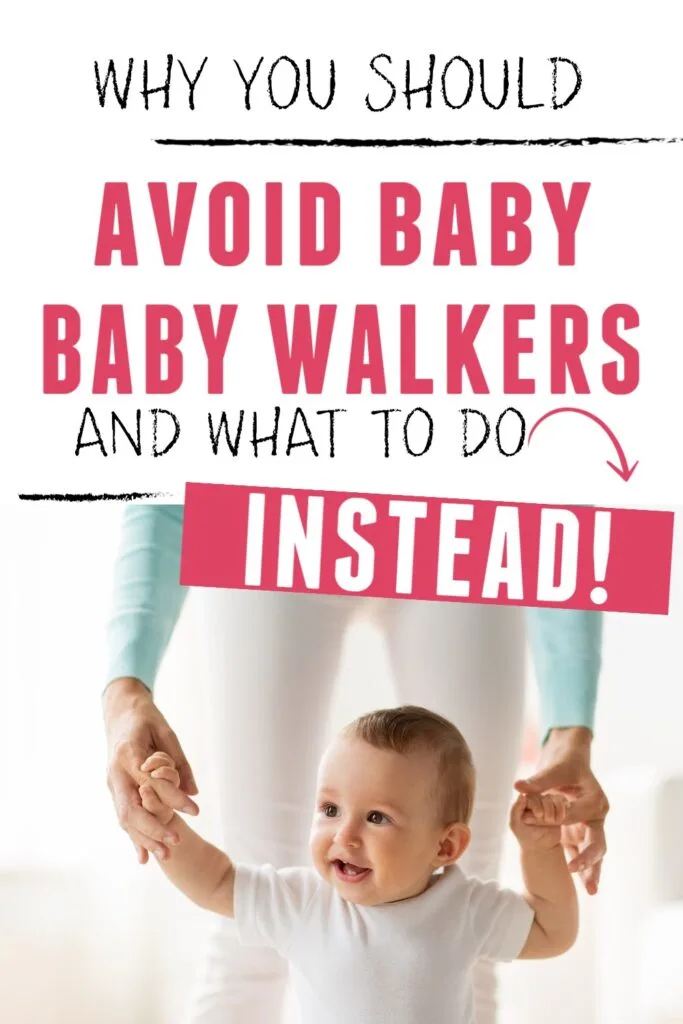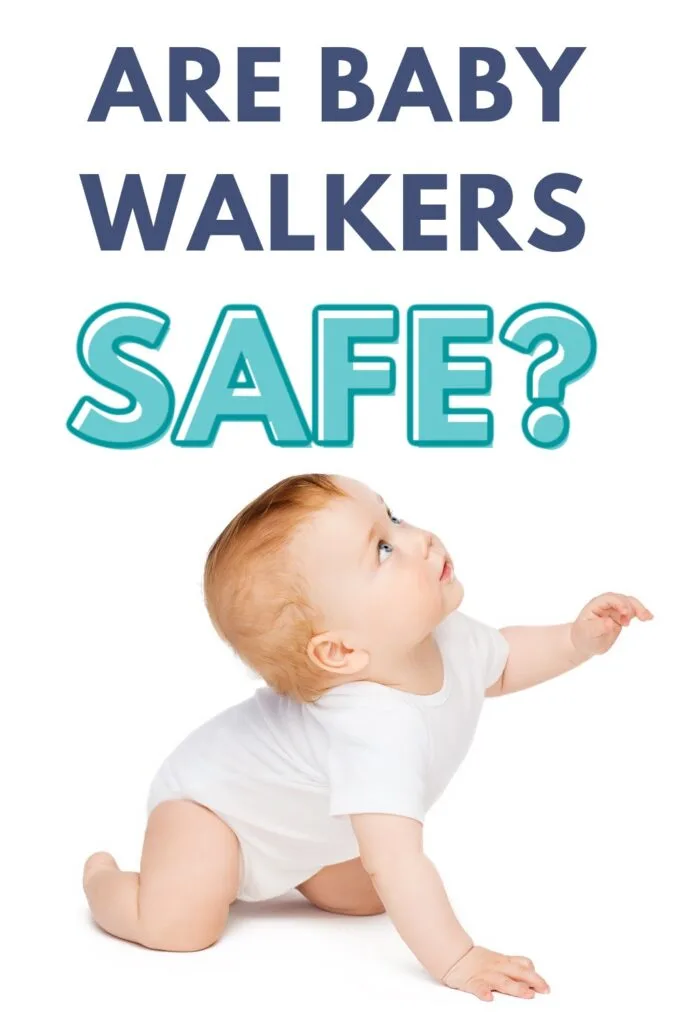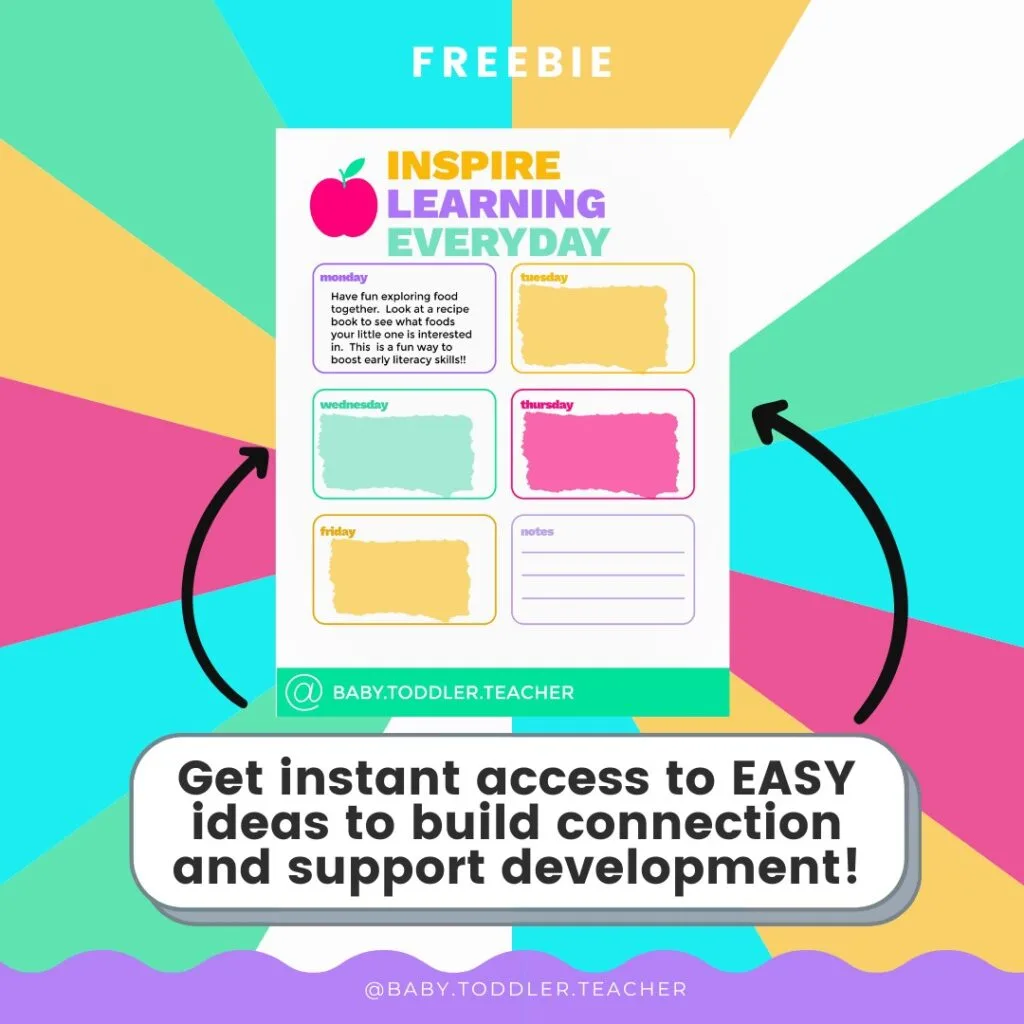Why You Want to Avoid Infant Walkers
As a parent, you naturally want what’s best for your little one, including tools and aids that might help them reach milestones, such as taking their first steps.
However, the use of baby walkers has been a subject of concern – not only is there a hidden risk of serious injuries, but they may also actually hinder motor development.
Despite their popularity, the American Academy of Pediatrics strongly advises against them owing to the increased risk of falls, sometimes even down the stairs, leading to alarming incidents and head injuries (read more about their stance here.)
Despite what the advertisements say, these devices do not support the natural process of learning to walk.
In this article, we’ll explore the reasons to avoid baby walkers, understand their impact on a child’s growth, and discuss safer, more beneficial alternatives to foster your child’s independent walking skills.

(This post may contain affiliate links. To read our full disclosure policy click here.)
The Misconception of Baby Walkers as Teaching Tools
Contrary to what you might expect, baby walkers do not contribute positively to your baby’s development or help them take their first steps with greater ease.
Instead, baby walkers hinder your little one’s natural progression because these devices may impede the essential stages that are pivotal for motor skills development while putting your baby at risk for serious injury.
Let’s delve into the effect of baby walker use:
- Delayed Motor Development: The design of walkers allows babies to move around by relying on alternative movements that skip crucial developmental milestones. Instead of rolling, crawling, and exploring their environment—which strengthens their muscles and coordination—they are confined to an unnatural position.
- Learning to Walk: Babies will learn to walk on their own when they are developmentally ready. The use of a walker can interfere with this natural process, your child has less time spent practicing important movements like pulling up and strength-building needed for those notable first steps.
- Reduced Free Play: By spending a significant amount of time in a walker, a baby misses the opportunity to freely explore their environment, which is critical for both cognitive and physical development.
A baby’s development thrives on unrestricted movement and environmental interaction and when we take that away we can sometimes see a negative impact on walking skills.
For parents, investing in a baby walker with the hopes that it will encourage walking, may do more harm than good.
Instead, fostering a safe space for your baby to move naturally supports their growth and paves the way for those precious first steps without the need for any special devices.

Encouraging Gross Motor Skills Without Walkers
Supporting your baby’s gross motor skills is vital for their overall development and can be achieved through simple and safe activities.
Here are a few ways you can encourage your child to develop these skills at their own pace:
- Engage with Activity Mats: Activity mats, often adorned with bright colors and toys, not only stimulate your baby’s senses but also promote the use of their entire body. As they reach for and interact with different textures and shapes, they are improving their coordination and strength.
- Prioritize Tummy Time: Regular tummy time is fundamental in young children’s development. Laying your baby on their stomach helps strengthen their neck, back, and leg muscles, essential for crawling, standing, and eventually walking.
- Ensure Plenty of Floor Play: Clear a safe space on the floor for your little one to explore. Free movement encourages babies to use their leg muscles and push off the ground, which is crucial for hitting developmental milestones such as rolling over, sitting up, and crawling.
- Invest in Simple Toys: Instead of walkers, opt for simple toys that require your baby to move and adjust their body to interact with them. Balls, push toys, and wooden puzzles are good alternatives that encourage mobility and problem-solving skills.
Remember to always supervise your baby, as they can quickly find their way into trouble.
Providing them with the freedom to explore safely under your watchful eye allows for natural growth and the joy of discovering the world at their own pace.

Grab your FREE Milestone Guide HERE.
Safer Alternatives to Baby Walkers
While seeking out the best support for your baby’s journey to their first steps, it’s crucial to consider options that ensure safety without inhibiting your child’s development.
Stationary activity centers (like these) and play yards (like this) offer a good option for parents looking to avoid the risks associated with baby walker injuries.
These alternatives provide a safe place for your child to play for brief periods.
It’s important to remember, however, that even these options should be used for only a short period each day to avoid restricting your child’s natural movement and exploration.
Another fantastic alternative is baby push walkers (like this one), which differ significantly from seated walkers.
These devices act more like a walking toy – a tool that your baby can hold onto and push along as they learn to walk.
Push toys encourage babies to stand upright and develop balance while providing minimal assistance, ensuring your child is doing the work themselves.
This encourages stronger development of the muscles and coordination required for walking.
Although these baby products can be beneficial when used correctly, it’s essential to keep in mind that they are not necessary for a child to learn how to walk.
Babies will naturally reach this milestone at their own pace, driven by their curiosity and innate ability to develop new skills.
With patience and your supportive presence, your baby will navigate their way to those cherished first steps.
Navigating the Milestones: A Safer Path to Walking
The allure of baby walkers is often rooted in tradition and perceived as a rite of passage towards walking.
However, it is important to recognize that these devices may pose a series safety hazards, including the risk of infant walker-related injuries.
Child development experts and ample research provide a clear verdict: the main reasons to steer clear of baby walkers are the lack of evidence supporting their effectiveness and the potential delay of important milestones in your child’s physical development.
Walking is an important skill that babies will naturally master on their own timeline, driven by innate determination and curiosity.
Instead of relying on walkers, you can support your child’s path to walking by focusing on encouraging unassisted movements and providing opportunities for them to achieve their developmental milestones safely.
This investment in your child’s early experiences will lay the groundwork for a lifetime of learning and growth.
As you accompany your child through the early years, embrace the moments of discovery and development without unnecessary devices.
Your patience and attentive supervision are invaluable as they explore and develop at their pace, ensuring a safer and more effective journey to those heartwarming first steps.
Related Posts You Will Enjoy
How to Find the Best Books to Read to Your Baby
Simple and Fun Outdoor Activities for Babies
The Best Balls for Babies and Toddlers
Fun Activities that Support Langauge Development for Babies
What to do When Your Baby Hates Diaper Changes


Kayla O’Neill has a master’s degree in education as well as a bachelor’s degree in special education with an emphasis in early childhood education. She has been working as a developmental therapist with babies and toddlers in early intervention since 2012. She is also a mom with two young children.
